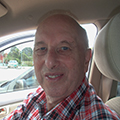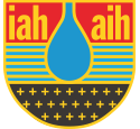Never expect “nature” to invent anything new, if a good model exists already elsewhere that will do the job, nature will use it…
December 2017: Our huge thanks go to Jeremy Joseph for his participation. We asked Jeremy because as well as being a long-standing IAH member and one of our kind and supportive mentors on the IAH mentoring scheme, he represents well what so many IAH members do in their lives, which is to is to begin life in one place, but travel, often finding their workplaces and homes elswhere in the world. Originally from the UK, Jeremy now lives in Thailand.
 Tell us a little about yourself….
Tell us a little about yourself….
I joined the Water Resources Board – a government body – in the UK as soon as I left university. That was pure chance because a friend pointed the advertisement out to me. We both applied and, to my continuing slight embarrassment, I was offered a job and he wasn’t. It’s not a job offer or a career that I’ve ever felt any reason to regret, however. Having started in the UK Civil Service, I retired as a consultant nearly fifty years later, having worked variously in the public, private and academic sectors, across three continents, as well as for large and small corporations – apart from government – and on my own. Hydrogeology is a life, not just a career. It can give you all of the breadth that you want or allow you to stay with a single employer in just one place working on one particular aspect or issue.
My career has covered a variety of sub-disciplines within the generality of hydrogeology and, in fact, that’s one of the subject’s attractions for me. The major (hydrogeological) aspects that I’ve covered, in roughly the order in which they happened, included – saline intrusion, groundwater resource management, data storage and management, artificial groundwater storage and recovery (ASR) [also known as artificial recharge], groundwater pollution (both point source and disperse), conjunctive use (ie, combined use of ground- and surface- water resources), tracer studies, and, waste management, including landfill and landfill impact monitoring.
During my career I’ve had three major “breaks” from hydrogeology. All taught me many things that I suspect that I wouldn’t have learnt had I stayed glued to the hydrogeological wheel, and I’d recommend such breaks to anyone who doesn’t wish to work solely in one specific technical area. In my case I trained, fairly early on, as a systems analyst and then pursued that aspect in terms of designing, developing and managing a data management system – they couldn’t be bought “off the shelf” in the 1970s – for a few years. Later, I managed support areas of the research body that I’d been working with, again, for several years. Later still, I managed a small company in the water treatment sector. All of these outside jobs were in the private sector and water-flavoured, and all helped to extend my experience and my understanding very considerably.
The moves into and between the public and private sectors were also interesting, and turned out not to be something to fear. Certainly the sectors are rather different, but each has practices and modes that are worth learning and can be brought “back” to the others. That seems also to be true of academia, which differs significantly, in my experience, from both the public and private sectors, and the opportunity to work (and learn from working) there added a lot of interest to life.
Why did you join IAH?
I was persuaded by my then manager to join IAH. At the time I felt that he was pushing things a bit far by suggesting that I join such an organisation. I know now, and have done for many years, that he was absolutely right (even though being right wasn’t usually one of his strong points). I’ve gained a lot – knowledge, understanding, confidence, friends, and so on – by joining IAH and remaining a member for more than forty years.
What would you say have been your career highlights?
I think that the best, and most honest, thing to say in this respect, is that I’ve never regretted becoming a hydrogeologist for one moment. As a science and a way of life, it’s excellent. There have been times when I’ve had disagreements or disliked particular things, but that’s part of life.
What experiences you have learned from, that you are willing to share with others?
It took me some years to learn that it is always wise to explain what is needed – ie, to be done – in reasonable detail. If purposes and methods are not clearly, and fully, understood, there will always be room for mistakes and errors, and you will be the person at fault.
What have been the biggest changes over your career?
The introduction first of analogue modelling, in the late 1960s, and then mathematical modelling have been the biggest technical changes during my career. Analogue modelling, in its day, was a tremendous move forward. Mathematical modelling was an even bigger and potentially better step. The crucial thing that seems not to be recognised widely is that every such model must, by definition, be based on a range of assumptions and simplifications. There is no shame in that but it remains true nevertheless. It is very foolish, although it happens very often, either to accept too much detail in the results produced – eg, as recently seen, predicted water levels published to a precision of 0.1 mm (0.0001 m) – and/or to think that the modelling outcomes are anything more than likelihoods. They cannot and are never likely to be precisely correct, other than by chance.
What piece of equipment have you found the most useful throughout your career?
The true answer to this, for me, is also a very basic one. It is always wise to use a pencil when writing – partly because the writing doesn’t then tend to wash off – and to take an eraser with you!
What are your concerns now or for the future, relating to groundwater/hydrogeology?
My main concern, really, is what seem to be increasing levels of over-confidence in the reality and/or quality of predictions provided by mathematical models. It is very important to look at any results with a critical eye and think about whether they make any sense in the real world. Reality checks are vitally important in all cases, and can only be carried out if all of the assumptions and simplifications – that means literally the whole lot – built into “the model” are reported fully and explicitly.
What tips might you give to someone just starting out on their study or career?
- Enjoy yourself, throughout your career.
- Be absolutely honest in detailing all of the assumptions and/or simplifications used in your work, whether that be modelling or anything else.
- Never expect “nature” to invent anything new, if a good model exists already elsewhere that will do the job, nature will use it.
- As an extra thought – nature doesn’t recognise any difference between surface- and ground- waters; in the real word they are one and the same, and there are and can be no boundaries within or between them.
What do you think those starting out should do to gain good experience?
Get out into the field and work on some pumping tests or other hydrogeological data gathering exercises, in the sense of taking and recording measurements.
What has being a member of IAH brought to you?
Many things, by far the most important of which are friends, and valuable links to and sources of technical knowledge.
Any last comments?
In the late 1960s in the UK there was still some minor discussion as to whether our science should be called hydrogeology or geohydrology – the latter would have chimed well with geochemistry and geophysics, and other terms of that sort, but we went the other way.
Jeremy Joseph



